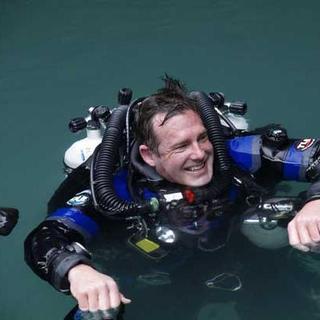
介绍:
Diving, especially scuba diving has recently grown in popularity among the younger crowd in China. Not satisfied with domestic waters, Chinese tourists are now traveling to the Philippines, Thailand and several other countries for aquatic activities.
There are many scuba diving organizations around the globe offering different levels of diving skills. Among them, Global Underwater Explorers, also known as GUE, is one that provides lessons in recreational, technical and cave diving. Jarrod Jablonski is President of the organization.
Mr. Jarrod Jablonski appeared in the recently-opened Diving & Resort Travel Expo Shanghai 2014.
Our reporter Chi Huiguang had a conversation with Mr. Jarrod Jablonski about scuba diving and the projects GUE has undertaken both within China and internationally.
CHG: Hello Mr. Jarrod Jablonski.
Mr. Jarrod Jablonski (JJ): Yes.
CHG: welcome to our show. Since there are more and more people enjoying scuba diving, please describe scenes one can catch underwater?
JJ: Yes. In the oceans, you can see the remarkable fish and all kinds of aquatic life, and in the caves, and the tremendous features and formations. And then of course you can also dive amazingly historical wrecks. In short, there is no end to the amount of amazing sites one can see underwater.
CHG: Yes. Why do you think more and more youngsters like diving?
JJ: I think diving offers tremendous mix of adventure and discovery. They can be very challenging as well provides a complete departure from the normal everyday life. So it gives you a chance to investigate and discover an almost alien world with amazing creatures and wonderful historical artifacts. It’s very exciting and I think as people learn to see this then they become attracted to it.
CHG: Have you or GUE ever looked into why diving is becoming so popular in China now?
JJ: I think it is as people become aware of diving, have the opportunities to see what amazing sport it is. More people get interested. And then of course people have the opportunities to increase their income. Then they also like to travel and visit places and also become aware of the excitement and adventure that is in scuba diving. So I think it will be continue to become much more popular in the years to come.
CHG: Would you like to share some of your most exciting and unforgettable experiences of diving with us?
JJ: I’ve had so many wonderful experiences and I’ve been diving for more than 20 years. It’s difficult to pick anything in particular. Among one of the more interestings of the several trips that we have explored the amazing caves you have here in China. So you have some of the beautiful caves. In addition, I’ve done some of the remarkable wreck dives, including a 5 hundred-year old ship wreck in Sweden, and the sister ship of Titanic. Many amazing places.
CHG: Oh you mentioned that you have visited the sister ship of Titanic?
JJ: There are 3 ships all built just like Titanic by the same company. Titanic is sitting in very deep water. And Britannic, which is the sister ship to Titanic, is in the 120 meters of water of the coast of Greece.
CHG: I know that you went diving in the underground river-system in Fengshan, southern China's Guangxi province. Right?
JJ: Yes, I did. The caves are world class caves. So some of the bests in the world. Remarkable size and beauty. Almost like a fairyland.
CHG: Do you think there is potential to develop more technical diving there?
JJ: I think in general in Guangxi province, there are numbers of very exciting opportunities. For cave diving, that will be interesting to international group of divers. Certainly there are numbers of opportunities. There are world class caves. So, yes, for sure.
CHG: OK. Let’s back to the basic knowledge of the scuba diving. What equipment does a diver need? And what are their main functions?
JJ: The main things that a diver need are types of tanks to hold the breathing supply. They need a regulator, which is the way that they breathe the gas that’s coming from the tank. And then they need some of kind of harness so they can wear their tanks. And then they need a way to add some gas to the vest so that they can get neutral under water. In some cases they also need some protection from the water, so they might need a wetsuit or a dry suit in order to stay warm. And the final two things: they need fins to push them so that they can kick in the water and they need a mask, so that they can see.
CHG: More outdoor enthusiasts in the northern part of China are more interested in mountain climbing than diving, being that there are more mountains than lakes in the region. However, with the growing popularity of diving, do you have any plans to expand diving operations up north?
JJ: Yes, definitely. Most people dive when they travel. That’s the most common, right? So some of the places that certify to teach the most number of divers actually don’t have any good local diving. So there will be no reason for someone to stay away from diving just because they don’t have a local place. They can still go to many other exciting places either in China or overseas. From China, you have an access to some of the best diving in the world. It’s quite easy to reach. And so it should not discourage anyone. And we will be very happy to support operations to the north or throughout China.
CHG: So the divers in the north get equipment and technique support?
JJ: Yes, definitely.
大家还在听

